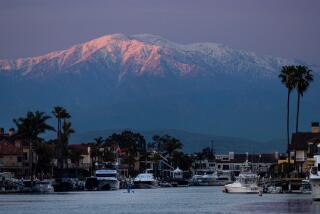New Jewish Cemetery Dedicated
- Share via
Mt. Sinai Memorial Park, which has been running out of burial space on its hillside site across the Los Angeles River from Burbank, has dedicated the largest Jewish cemetery west of the Mississippi River at a new location in Simi Valley.
The location presents a study in contrasts: Although Simi Valley has a population of more than 100,000, so few of them are Jews that the city has only one synagogue, a 100-family Reform temple.
But it is also estimated that nearly 100,000 Jews live in the nearby western San Fernando Valley and the Conejo Valley to the south, said Jack Mayer, executive director of the Valley Jewish Alliance, based in West Hills.
“I think it was very far-sighted on the part of Mt. Sinai to recognize an essential need,” Mayer said. “We’ve been experiencing a flow of young families into these areas.”
Dedicated last month, the 160-acre Mt. Sinai site in Simi Valley is off the Simi Valley Freeway, only five miles west of the Los Angeles-Ventura county border.
Indeed, the cemetery is being touted as an extension of Los Angeles Jewish institutions, which were mostly centered in Boyle Heights in East Los Angeles early in the 20th century and later moved west and north with the Jewish population and its descendants.
Mt. Sinai began in the 1950s as a part of Forest Lawn Memorial-Park, Hollywood Hills. In 1964, Sinai Temple in Westwood bought the property.
Like most other Jewish cemeteries, Mt. Sinai serves the entire community, regardless of religious affiliation. In addition, many Jews chose to be buried in non-Jewish cemeteries such as Forest Lawn.
*
Diminishing space has been a general concern for cemetery officials in the Los Angeles area, including Mt. Sinai, which has only 15 acres of grave sites left on its 82 acres nestled against Griffith Park, according to General Manager Arnold R. Saltzman.
The acquisition in Simi Valley solved Mt. Sinai’s problems, he said.
Although the first burials there will probably not occur for 12 to 18 months, Saltzman said they may continue for a while--the new cemetery should not run out of space for 250 years.
“That development will extend the life, if I may use that term, of this property,” Saltzman said, referring to the original site near Burbank. “Sales will slow down [at the original] because people have a choice of another site.”
Saltzman said Mt. Sinai purchased, for an undisclosed price, a total of 380 acres.
“Almost half of that was conveyed back to the city because the terrain was too rough,” he said. The city will maintain that land for hiking and biking trails and three small parcels will be sold for housing development, he said.
An estimated 2,300 people attended day-long dedication ceremonies March 16 at which Reform, Conservative and Orthodox rabbis from synagogues in Encino, Westwood, Bel-Air and Beverly Hills carried Torah scrolls around the perimeter of the cemetery.
Not forgotten in the crowd was Rabbi Michele Paskow and members of Simi Valley’s lone synagogue, Congregation B’nai Emet.
The synagogue started as a small fellowship about 15 years ago. Its membership now is the highest in its history, with 140 children in its religious school and attendance at services of 60 to 200 people, Paskow said.
The congregation, after meeting for years in the social hall of a Lutheran church, now assembles in an industrial park in a space sandwiched between a landscaping firm and a youth dance studio.
“There is not a large Jewish population in Simi Valley, but we draw a handful of families from Chatsworth and many from Moorpark,” said Paskow, who has been the congregation’s part-time rabbi for five years.
Her father is Rabbi Shimon Paskow of Temple Etz Chaim, a Conservative synagogue in Thousand Oaks. Michele Paskow studied for the rabbinate at Hebrew Union College, the Reform Judaism seminary, and was ordained at the New York school in 1991.
But because the Simi Valley temple tries to serve families with backgrounds ranging from nonreligious to Orthodox, the younger Paskow quipped: “We are ‘Re-conserva-dox.’ We try to be respectful of tradition and yet attend to what happens in this day and age--with a lot of focus on school-age kids.”
More to Read
Sign up for Essential California
The most important California stories and recommendations in your inbox every morning.
You may occasionally receive promotional content from the Los Angeles Times.













